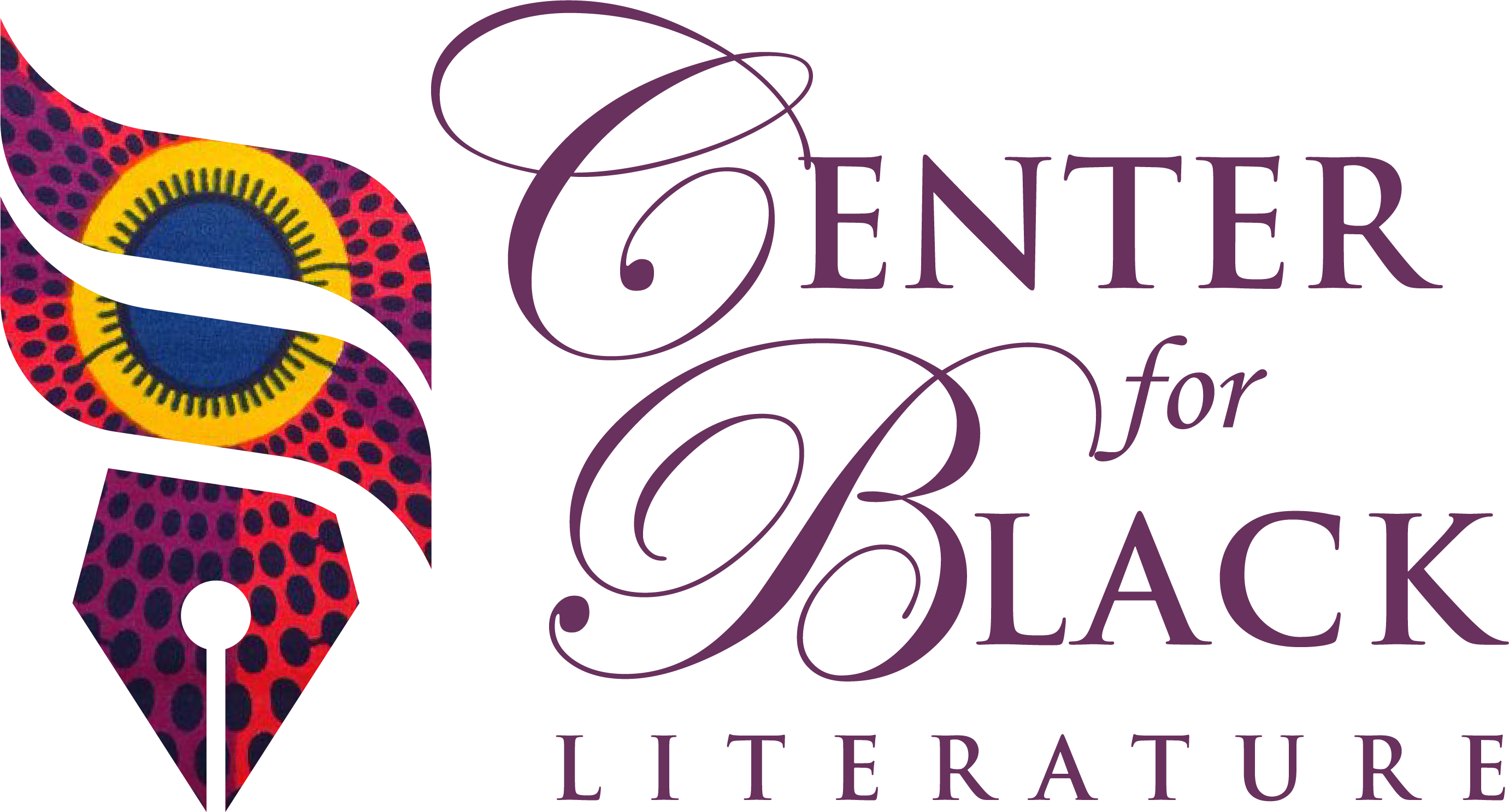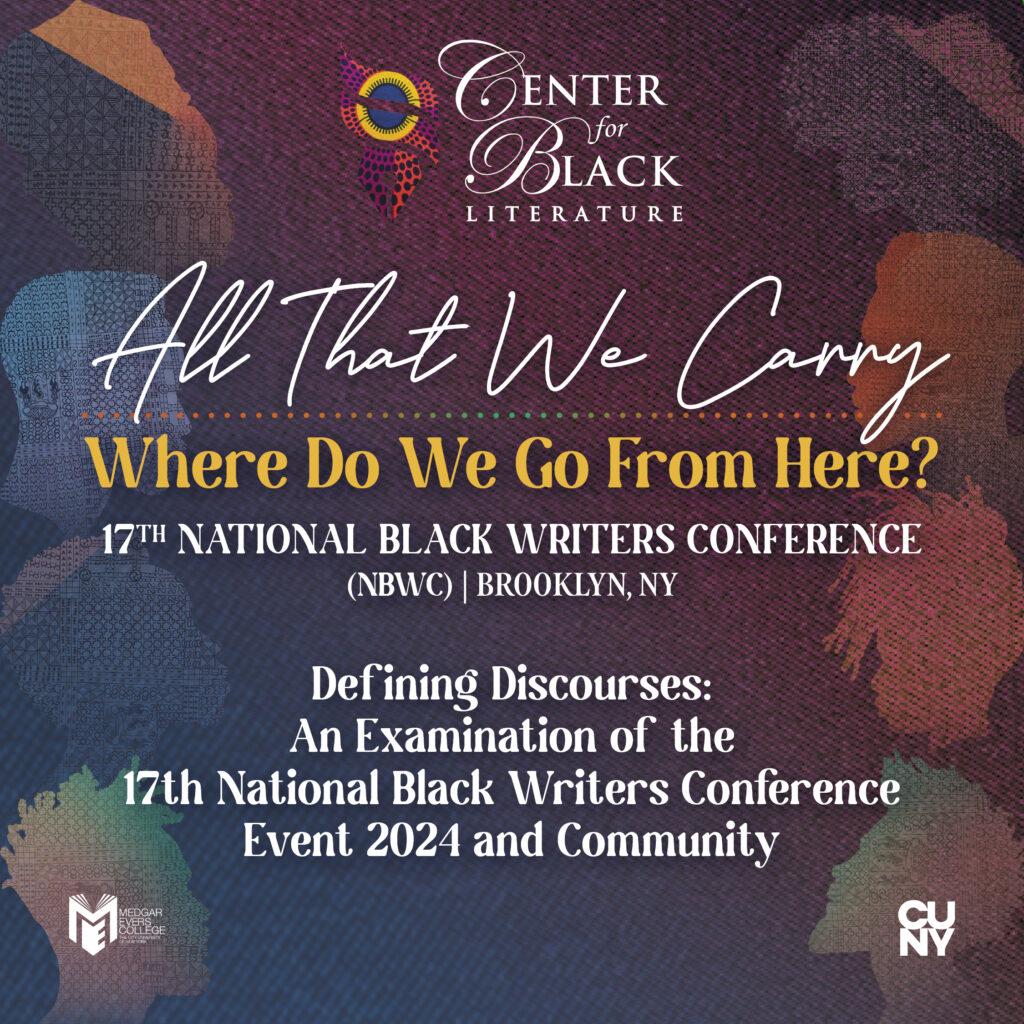Levi Wise-Catoe | April 29, 2024
On Friday, March 22, 2024, the National Black Writers Conference presented its summit keynote, a conversation with the 2024 NBWC Honorees Paul Coates, Peniel E. Joseph, and Bernice L. McFadden, with Gloria Browne-Marshall moderating. The event offered an opportunity for the honored authors to share their stories and discuss what writing means to them, followed by a Q&A session, which opened the mic to the audience for responses to the authors. The 17th NBWC is relevant to everyone but necessary for both the intergenerational and intragenerational African Diaspora communities. The conference takes place in a college setting, which aims to create an atmosphere oriented toward the future of Black America and positions Medgar Evers College as a vital space for both the Brooklyn community and for Black culture in NYC.
In the Summit Keynote, I found the moderator, Gloria J. Browne-Marshall, thoroughly prepared for the conversation. Browne-Marshall is a writer, civil rights attorney, playwright, and professor of constitutional law at John Jay College (CUNY). Browne-Marshall has also taught in the African Studies program at Vassar College. She directed her line of questioning towards both the panel and the attendees in a way in which everyone felt involved in the dialogue, but I must say that I found the panel imbalanced in the absence of Percival Everett, because Bernice McFadden, a creative writer, seemed unprepared for scholarly dialogue that precipitated between Peniel Joseph and Paul Coates. This was no fault of her own, it’s just that the journey of a creative writer is less expected, and more spontaneous. I have found it harder for others to understand sometimes how writing for some writers is not learned but found or discovered, whereas being expected to write something by assignment is more recognizable, and in some cases becomes more of a chore. This is especially true in a college setting, such as Medgar Evers College, where the conference took place, among students where the expectation to write by assignment is more relatable. This is why I felt McFadden had less engagement, because the conversation became more about social politics than creative writing, an area in which McFadden is a master. Her books, Sugar, The Warmest December, and The Book of Harlan, were all crowd favorites, as was McFadden herself.
Joseph, on the other hand, is a scholar, teacher, and public voice on race issues, especially the history of the Black Power movement. His discourse seemed to coincide more with the racial discourse and racial politics of Coates, which created a strong rhetorical discussion around race and, more specifically, an academic engagement with the so-called Third Reconstruction, which is the focus of one of Joseph’s books. This concept dominated the discussion such that the absence of Percival Everett didn’t feel missed due to the riveting conversation about the apparent Third Reconstruction.
Paul Coates, an American publisher, printer, and community activist, had less to say than Joseph for sure. Coates, as a publisher, was more inclined to listen to writers speak than he was to speak on what it feels to be a writer; in fact, he possibly attended every panel discussion and was very interested in what every writer had to say. Coates had a keen interest in the discourse that Joseph had been speaking, which was interesting, to say the least. This idea that in the U.S. there were three eras of reconstruction—the period after the Civil War; the Civil Rights era; and the current period spanning the election of Barack Obama, the rise of Black Lives Matter, and the failed assault on the Capitol—is speculative yet compelling.
An audience member asked the honorees to explain their writing processes and asked if the writers could give examples of how they stay motivated to continue writing, whether in creative, academic, and scholarly or rhetorical modes. McFadden spoke first and explained how writing, for her, is something organic and natural and how writing is beyond her control. She also stated that in her process, writing consists ofwords that spill out of her soul. In contrast, for Joseph, it is more of a routine to fulfill. Joseph responded to the question by saying if writing is something that you strive for, whether in the field of academic scholarly papers or creative writing, one should commit to at least an hour a day of writing just to motivate ideas, revisit concepts,and make it a practice every day to just write. Coates as a publisher had less to comment on that question but he did provide an earlier comment that I found riveting on the topic of rhetoric. He stated that felt that the Black Panther Party talked too much and that the rhetoric around the Black Panther Party made the Black Panther Party. This comment was controversial, to say the least, but coming from a comrade of the movement, it’s hard to argue considering I wasn’t there. His comment gave context to how subjective writing and language can be.
Towards the end of the panel, I loved a comment that Marshall gave to an audience member who was a teacher. The teacher asked the panel how to inspire young writers to write from history when they complain about being tired of hearing about Black history and slavery. Marshall responded, and I am paraphrasing, “Instruct your students to put down the pen. If you feel that the topic is too much to handle, take a deep breath, step away from the page, and then come back. Because if slavery is traumatic to you, yet you have never experienced it, imagine what it was like for the formerly enslaved who had to endure it. Think of how the formerly enslaved people suffered so that you (Black students today) can now be the writer that you aspire to be today. How dare you say you don’t even want to hear any more about it while standing on the shoulders of ancestors who withstood it?” And with that, I was awestruck. This was a great way to end a panel with a combination of hope and critical analysis; subjective but still critical.
After the conference, the organizers asked attendees to share their opinions about the 2024 NBWC. The opinions differed but overall were positive. One person exclaimed, “The art was powerful, it was healing, and it brought everyone together”; he added that everything was well organized and executed flawlessly. According to another attendee, “Being submerged in Blackness was a defining moment for me.” One attendee asked, “Can we make the conversation style more conversational, like a back-and-forth?” Others commended speaker Dr. Tiya Miles for her “excellent delivery, language skills, and knowledge” and shared their appreciation for her “expertise and scholarship in African American history and material culture.” Attendees particularly valued “the opportunity to hear the author Tiya Miles, provide background about her writing process and her works. She also provided insight into historical relations between Native Americans and African Americans intertwined together in communities.” They also thought “Tiya Miles’ and Dr. Brenda Greene’s approach to the Q&A was great.” Some commented that “the conference, the gaining of insight, and the backstories of the relatable books were enlightening and amazing.” According to another attendee of the Dramatic Reading for Elders panel, “I really enjoyed listening to the memorial tributes of the Elders Group members. I also enjoyed hearing the stories written by the group members.” For many, the only complaint was that, “time was too short” or “the program on Black Diasporic Literature centers on writers from lesser-known and established Black and Black Indigenous writers: Canada, Dutch-Caribbean, Brazil, Australia, Papua New Guinea, and Germany”. The overall consensus by the end of the event regarding what could be done differently to improve upon it next time was, “Nothing at this time—everything was wonderful.”
Overall, I found Dr. Brenda Greene to be an irreplaceable conference director. She sits in on every event overseeing and analyzing everything in a knowledgeable way which most wouldn’t. I confirm her interest and her commitment to both literature and the mission of the conference and if in fact it becomes Greene herself in the moderator’s seat nobody does it better. The community of Crown Heights definitely came out but I also noticed people from outside the Brooklyn community. I noticed parents with children which became part of the mission of the conference, “All That We Carry Where Do We Go From Here”; only the youth can answer that question, and only the current student body can offer a suggestion. My advice to Medgar Ever College is to make the National Black Writers Conference part of the syllabus. This would ensure that most of the student body is in attendance. There was a conversation that every student needed to hear—if not all panels were relevant to every student, there was at least one panel for everyone. I was happy to attend and I look forward to the preceding conferences. So there you have it: the 17th National Black Writers Conference of 2024.

